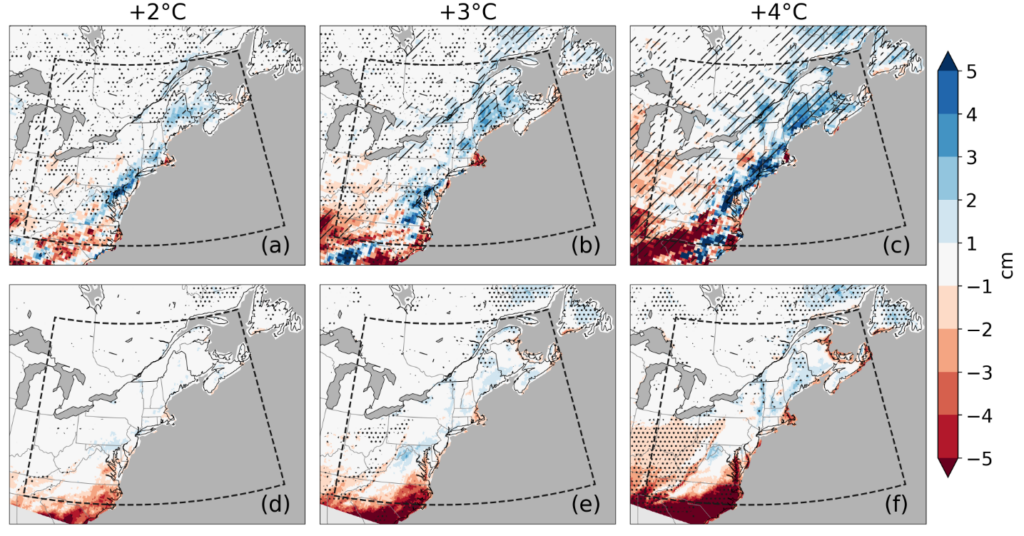
This figure shows modeled predictions for how the most extreme snowfall events will change for the northeastern U.S. under 2, 3, and 4 degrees C of warming. Credit: McCray et al., JGR Atmospheres
Featured research
Volcanoes may have larger impact on future climate than expected
Models used to predict climate change may underestimate the cooling impact of volcanoes. A new study found that volcanic sulfur dioxide emissions from 2015 to 2100 will likely exceed the volume of emissions from 1850 to 2015. The authors suggest climate models use scenarios that better represent future volcanic activity instead of historic eruption data. [Geophysical Research Letters research]
Eastern North American snowstorms to shift north as climate warms
Annual total snowfall is likely to decrease across the northeastern United States and southeastern Canada as temperatures rise. However, major snowstorms will shift northward and produce most of the region’s snowfall during a few large events. [JGR Atmospheres research]
Rising temperatures lower Venice’s salt marshes’ ability to sequester carbon
Salt marshes decompose organic matter slowly, allowing them to sequester and store carbon for long periods of time. In a new study, scientists found that an increase in temperature by one-degree Celsius led to an 8% increase in the marsh’s decomposition rates. As the climate warms, a quicker rate of decomposition could cause the marsh to release more carbon dioxide into the atmosphere. [JGR Biogeosciences research]
Western Amazonia more vulnerable to tree-flinging thunderstorms
Rainforests in western Amazonia are at a higher risk of windthrows than the rest of the Amazon, a new study found. Increasingly large convective storm systems paired with a slower tree growth rate and lower wood density leave this region particularly susceptible to tree mortality – contributing to deforestation and releasing carbon into the atmosphere. [Geophysical Research Letters research]
A new workflow to image the 3D structure of active faults
A new approach to illuminate 3D fault structures using earthquake hypocenters could help detect previously unknown, potentially hazardous earthquake-generating faults and improve understanding of earthquakes processes in general. [Eos Editors’ Highlights] [JGR Solid Earth research]
***
Visit the AGU Newsroom to register for access to AGU journals and find experts and featured research in various topic areas. Visit eos.org to read Research Spotlights and Editors’ Highlights.
***
AGU (www.agu.org) is a global community supporting more than half a million advocates and professionals in Earth and space sciences. Through broad and inclusive partnerships, AGU aims to advance discovery and solution science that accelerate knowledge and create solutions that are ethical, unbiased and respectful of communities and their values. Our programs include serving as a scholarly publisher, convening virtual and in-person events and providing career support. We live our values in everything we do, such as our net zero energy renovated building in Washington, D.C. and our Ethics and Equity Center, which fosters a diverse and inclusive geoscience community to ensure responsible conduct.